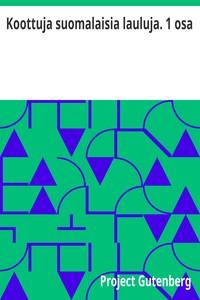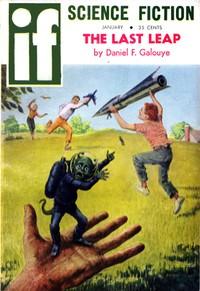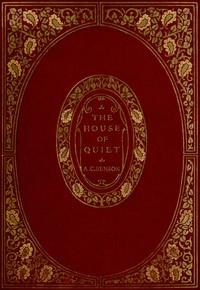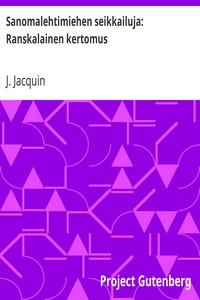Read this ebook for free! No credit card needed, absolutely nothing to pay.
Words: 82308 in 33 pages
This is an ebook sharing website. You can read the uploaded ebooks for free here. No credit cards needed, nothing to pay. If you want to own a digital copy of the ebook, or want to read offline with your favorite ebook-reader, then you can choose to buy and download the ebook.


: Beside the Fire: A collection of Irish Gaelic folk stories by Nutt Alfred Tr Bner Contributor Hyde Douglas Editor - Tales Ireland; Celts Ireland Folklore
PREFACE: Previous collections of Irish folk-lore; ignorance of the language on the part of collectors. Relation between Irish and Scotch Gaelic tales; the Irish bardic tales; the runs in Irish and Scotch. Date of Irish versions. Two classes of Irish stories; native myths. Narrators of the stories. Discouragement of Irish by schoolmasters, clergy, and politicians. Proper mode of collecting. System of translation accepted. PAGE, ix-l.
POSTSCRIPT : Dr. Hyde's theories discussed; folk-lore and romance; necessity for romance to conform to convention; characteristics of folk-fancy; classification of the products of folk-fancy; myth, saga, M?rchen and ballad; romance and folk-lore among the Gael; folk-conception of the Universe Page, li-lviii.
TALES.
Where the Stories came from 173-174
Notes 175-195
Notes on the Irish Text 197-200
Index of Incidents 201-203
PREFACE
Irish and Scotch Gaelic folk-stories are, as a living form of literature, by this time pretty nearly a thing of the past. They have been trampled in the common ruin under the feet of the Zeitgeist, happily not before a large harvest has been reaped in Scotland, but, unfortunately, before anything worth mentioning has been done in Ireland to gather in the crop which grew luxuriantly a few years ago. Until quite recently there existed in our midst millions of men and women who, when their day's work was over, sought and found mental recreation in a domain to which few indeed of us who read books are permitted to enter. Man, all the world over, when he is tired of the actualities of life, seeks to unbend his mind with the creations of fancy. We who can read betake ourselves to our favourite novelist, and as we peruse his fictions, we can almost see our author erasing this, heightening that, and laying on such-and-such a touch for effect. His book is the product of his individual brain, and some of us or of our contemporaries have been present at its genesis.
But no one can tell us with certainty of the genesis of the folk-tale, no one has been consciously present at its inception, and no one has marked its growth. It is in many ways a mystery, part of the flotsam and jetsam of the ages, still beating feebly against the shore of the nineteenth century, swallowed up at last in England by the waves of materialism and civilization combined; but still surviving unengulfed on the western coasts of Ireland, where I gathered together some bundles of it, of which the present volume is one.
After this come Lady Wilde's volumes;--her "Ancient Legends," and her recently published "Ancient Cures, Charms, and Usages," in both of which books she gives us a large amount of narrative matter in a folk-lore dress; but, like her predecessors, she disdains to quote an authority, and scorns to give us the least inkling as to where such-and-such a legend, or cure, or superstition comes from, from whom it was obtained, who were her informants, whether peasant or other, in what parishes or counties the superstition or legend obtains, and all the other collateral information which the modern folk-lorist is sure to expect. Her entire ignorance of Irish, through the medium of which alone such tales and superstitions can properly, if at all, be collected, is apparent every time she introduces an Irish word. She astonishes us Irish speakers with such striking observations as this--"Peasants in Ireland wishing you good luck, say in Irish, 'The blessing of Bel and the blessing of Samhain be with you,' that is, of the sun and of the moon." It would be interesting to know the locality where so curious a Pagan custom is still practised, for I confess that though I have spoken Irish in every county where it is still spoken, I have never been, nor do I expect to be, so saluted. Lady Wilde's volumes, are, nevertheless, a wonderful and copious record of folk-lore and folk customs, which must lay Irishmen under one more debt of gratitude to the gifted compiler. It is unfortunate, however, that these volumes are hardly as valuable as they are interesting, and for the usual reason--that we do not know what is Lady Wilde's and what is not.
Almost contemporaneously with Lady Wilde's last book there appeared this year yet another important work, a collection of Irish folk-tales taken from the Gaelic speakers of the south and north-west, by an American gentleman, Mr. Jeremiah Curtin. He has collected some twenty tales, which are told very well, and with much less cooking and flavouring than his predecessors employed. Mr. Curtin tells us that he has taken his tales from the old Gaelic-speaking men; but he must have done so through the awkward medium of an interpreter, for his ignorance of the commonest Irish words is as startling as Lady Wilde's. He follows Lady Wilde in this, too, that he keeps us in profound ignorance of his authorities. He mentions not one name, and except that he speaks in a general way of old Gaelic speakers in nooks where the language is still spoken, he leaves us in complete darkness as to where and from whom, and how he collected these stories. In this he does not do himself justice, for, from my own knowledge of Irish folk-lore, such as it is, I can easily recognize that Mr. Curtin has approached the fountain-head more nearly than any other. Unfortunately, like his predecessors, he has a literary style of his own, for which, to say the least of it, there is no counterpart in the Gaelic from which he has translated.
Free books android app tbrJar TBR JAR Read Free books online gutenberg
More posts by @FreeBooks


: The Divers by Stamers James Wood Wallace Illustrator - Science fiction; Parapsychology Fiction; Astral projection Fiction





